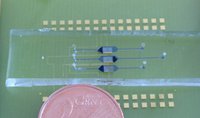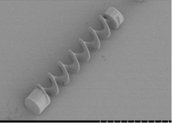
Nanotechnology and microfluidic devices Team


The research team aims at understanding biophysical phenomena within microfluidic devices, as well as at promoting new nanofabrication technologies for the life sciences. The development of extremely sensitive, highly selective, simple, robust and yet inexpensive biosensing platforms is essential for a wide range of applications, including clinical diagnostics, environmental monitoring and food safety testing. In this multidisciplinary research field of microfluidic analysis, we will pursue developing new technological processes to produce fully integrated “Labs-on-a-chip” devices based on innovative hard and flexible materials. Studying on-a-chip electrophoresis separation and preconcentration methods with high resolution and repeatability by using real time monitoring of the surface charge will be an important issue. In parallel developing advanced integrated nanophotonic and electrochemical sensors for sensing of specific biomarkers of disease or pathogenic agents will be a second important route where new geometrical designs combined with innovative transducer materials, such as carbon nanotubes and graphene monolayers, have to be explored. Micro/nanorobotic swimmers can serve as alternative microfluidics tools toward biological and biomedical applications. The aim of this project is to propose the most efficient and controlled microswimmers with remotely controlled therapy function like drug delivery. The swimming performance and colloidal cargo transport function of microswimmers will be evaluated inside smart microfluidic control platform. A final experiment of delivering and mixing colloids by microswimmers inside microfluidic environment will simulate their future in vivo and lab-on-a-chip applications.
More details here on the Nanotechnology and microfluidic devices team.